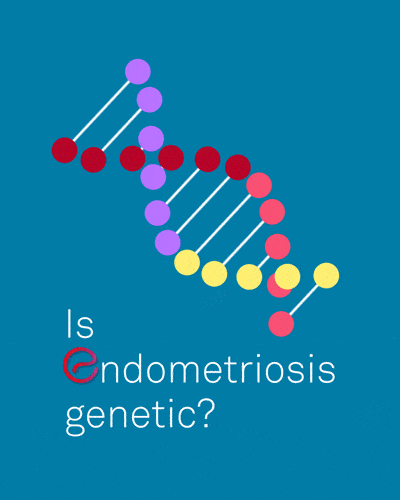Is Endometriosis Genetic?

Endometriosis is a debilitating disease that affects approximately 10% of women of reproductive age. The exact cause of the disease is not clear. However, there may be genetic factors that predispose some women to develop the disease. Researchers believe that interactions between multiple different genes and the environment may determine the development of endometriosis.
Studies have shown that the risk of developing endometriosis is higher in women who have a close relative who also has the condition.
Older studies have shown that women with a first-degree relative who has endometriosis have a seven to 10 fold higher risk of having endometriosis themselves. A more recent study demonstrated that approximately 7% of first-degree relatives (mothers and sisters) of patients with endometriosis also have the disease.
Another study analyzed the prevalence of endometriosis among the relatives of 101 patients. It compared them to the relatives of those without endometriosis. The results showed that the incidence of endometriosis was higher in the first-, second-, and third-degree relatives. These included the mothers, sisters, aunts, and cousins of the patients.
A cohort study also found a higher incidence of endometriosis in the first-degree relatives of patients with endometriosis compared to those without the disease.
Multiple genetic factors may play a role
A 2019 review included several studies that focused on the identification of genetic variations related to endometriosis. The study listed about 30 genes associated with the disease.
These genes play a role in important functions such as DNA repair, immunity, inflammation, hormonal function, cell proliferation, cell differentiation, cell death, and detoxification.
However, no single gene seems to be solely responsible for the disease. There may be cases where a mutation is present in a certain gene but no manifestation of endometriosis. Or there may be cases where the disease is present but there is no genetic mutation.
Therefore, experts suggest that a combination of genetic and environmental factors act together for the development of endometriosis.
Environmental factors
Environmental factors may influence cell function by affecting the genome through epigenetic modifications. Epigenetic modifications are stable alterations in how a gene makes a protein. They lead to no underlying modifications in the gene sequence itself. Studies have shown variations in the epigenetic patterns of genes that play a role in the hormonal, immunologic, and inflammatory status of cells in endometriosis.
A recent study showed that dietary exposure to dioxin is associated with an increased incidence of endometriosis. Dioxin is a toxic chemical byproduct that occurs in places of uncontrolled burning and recycling of fuels and electronics. Researchers think that dioxin could lead to epigenetic alterations in the DNA and increase the risk of endometriosis.
There are many areas of research yet to be undertaken in the field of endometriosis and its genetic associations. Studies to date have shown that genetics certainly plays a role. However, many more questions remain.
Get a Second Opinion
Our endometriosis specialists are dedicated to providing patients with expert care. Whether you have been diagnosed or are looking to find a doctor, they are ready to help.Our office is located on 872 Fifth Avenue New York, NY 10065.
You may call us at (646) 960-3080 or have your case reviewed by clicking here.